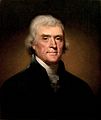Democratic-Republican Party
The Democratic-Republican Party (until 1798 only Republican Party) emerged in the early years of the United States of America as the Republican Party and counterpart to the Federalists, who had earlier clearly prevailed in the drafting of the American Constitution with their ideas of a strong federal government. Contemporarily, almost the only term in use was Republican Party, while historians use the then-occasional term Democratic-Republican Party to distinguish it from the not-to-be-confused modern Republicans. Since Thomas Jefferson, alongside former Federalist James Madison, founded the party around 1791 and had great influence on its program, it is also called the Jeffersonian Republicans.
The party had its origins in the groups of the Anti-Federalists and the Anti-Administration Party, who spoke out against too strong a central government for the still young USA and against Alexander Hamilton's financial policy, as they feared for the rights of the individual states and the individual citizens. In addition, their supporters had sympathies for the ideas of the French Revolution and strongly opposed a reapproach to the former colonial power, Great Britain. After the nonpartisan General of Independence George Washington and Federalist President John Adams, Thomas Jefferson was the first Democratic-Republican president. After the disintegration of the Federalist Party as a result of the War of 1812, the Democratic-Republican Party was for a time the only significant party. James Monroe had virtually no opponent as incumbent president in 1820, having won handily against the historically last Federalist candidate in 1816.
In the presidential election of 1824, however, four Democrat-Republicans ran against each other for Monroe's succession. Andrew Jackson received the most votes, but not an absolute majority. The House of Representatives, which in such cases chooses the president from the three candidates with the most votes, determined - with the mediation of its speaker and fellow candidate Henry Clay - John Quincy Adams as president. Clay was subsequently appointed to Adams' cabinet. This process, overshadowed by allegations of corruption, led to a lasting rift within the party between Jackson's and Adams's supporters. Shortly thereafter, the party broke up into the Democratic Party, still in existence today, the supporters of Jackson, who was eventually elected president in 1828, and the short-lived National Republican Party, the supporters of Adams and Clay.

Thomas Jefferson, leader of the party (Rembrandt Peale, 1800)
Democratic-Republican Presidents
- Thomas Jefferson (1801-1809)
- James Madison (1809-1817)
- James Monroe (1817-1825)
- John Quincy Adams (1825-1829)
See also
- List of political parties of the United States
Questions and Answers
Q: Who founded the Democratic-Republican Party?
A: The Democratic-Republican Party was founded by Thomas Jefferson and James Madison in 1792.
Q: When did the Democratic-Republican Party become the most popular political party?
A: The Democratic-Republican Party became the most popular political party until the 1820s.
Q: Why did Jefferson and Madison create the Democratic-Republican Party?
A: Jefferson and Madison created the Democratic-Republican Party in order to oppose the economic and foreign policies of the Federalists.
Q: Who created the Federalist Party?
A: The Federalist Party was created by Treasury Secretary Alexander Hamilton.
Q: What foreign policy issues were central to the Democratic-Republican Party?
A: Foreign policy issues were central to the Democratic-Republican Party, specifically the party opposed the Jay Treaty of 1794 with Britain and supported good relations with France before 1801.
Q: What were the views of the Democratic-Republican Party on Hamilton's proposals concerning the Constitution?
A: The Democratic-Republican Party was against many of Hamilton's proposals concerning the Constitution.
Q: Is the Democratic-Republican Party the same as the modern-day Republican Party?
A: No, the Democratic-Republican Party is different from the modern-day Republican Party.
Search within the encyclopedia